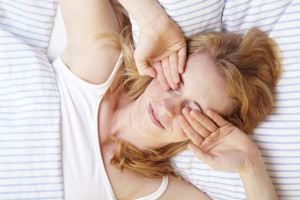Sleep deprivation has been reported to contribute to several disease processes and to reduce longevity. It leads to hormonal and neurochemical changes. In the short term lack of sleep reduces performance and alertness. Cognition and memory are impaired and the risk of injury increases with sleep deprivation. In the long term the consequences of sleep deprivation are worse: high blood pressure, heart attack, stroke, obesity and depression. Now you can add dry eye to the list.
A recent study of very healthy young male subjects implies that the tears are negatively affected by less sleep. The subjects were not allowed to sleep for 24 hours. When multiple measurements of their tears were compared to the subjects that slept for 8 hours there was a significant difference. The tears evaporated quicker, the tear volume was less and inflammatory markers were higher. It doesn’t take much to imagine that combined with other factors that contribute to dry eye disease such as medications, hormones and eyelid health, sleep deprivation will worsen the condition. Dry eye disease is a common ocular surface disease associated with symptoms of eye discomfort, grittiness and visual disturbance.
Conquering the causes of sleep deprivation should be foremost in maintaining good health, and having a dry eye evaluation to improve the tear quality is also recommended.
